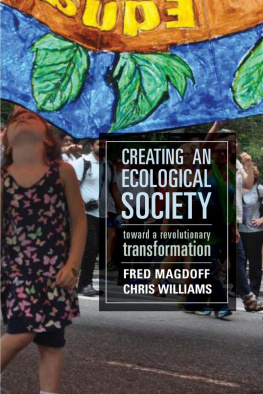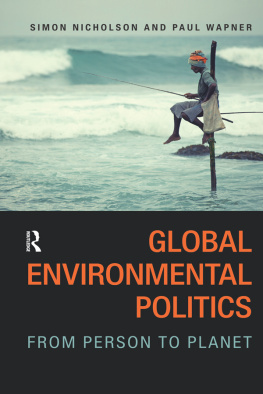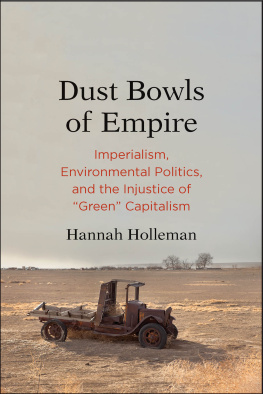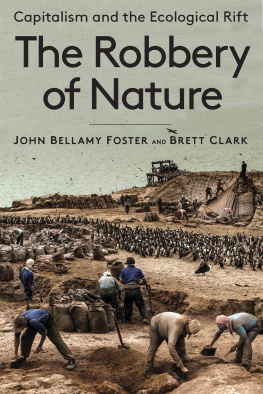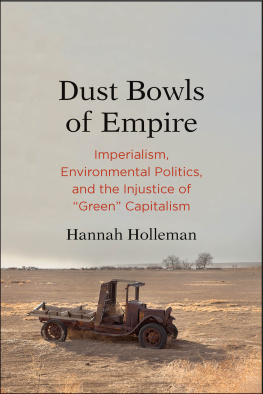What Every Environmentalist Needs
to Know about Capitalism
What Every Environmentalist Needs to Know about Capitalism
A Citizens Guide to Capitalism and the Environment
Fred Magdoff and John Bellamy Foster

Copyright 2011 by Fred Magdoff and John Bellamy Foster
All rights reserved
Library of Congress Cataloging-in-Publication Data
Magdoff, Fred, 1942
What every environmentalist needs to know about capitalism : a citizens guide to capitalism and the environment / Fred Magdoff and John Bellamy Foster.
p. cm.
Includes bibliographical references and index.
ISBN 978-1-58367-241-9 (pbk. : alk. paper) ISBN 978-1-58367-242-6 (cloth : alk. paper) 1. Environmental economics. 2. Capitalism. 3. EnvironmentalismEconomic aspects. 4. EnvironmentalismPolitical aspects. 5. Environmental policy. I. Foster, John Bellamy. II. Title.
HC79.E5M329 2011
330.122dc23
2011021515
Monthly Review Press
146 West 29th Street, Suite 6W
New York, New York 10001
www.monthlyreview.org
www.MRzine.org
5 4 3 2 1
Preface
Wealth, if limits are not set for it, is great poverty.
EPICURUS
Ecological economist Herman Daly is well known for emphasizing what he has called the Impossibility Theorem of unlimited economic growth in a limited environment. Put concretely, an extension of a U.S.-style high consumption economy to the entire world of 7 billion peoplemuch less the 9 billion-plus world population In this book we are concerned with extending Dalys Impossibility Theorem by introducing what we regard to be its most important corollary: the continuation for any length of time of capitalism, as a grow-or-die system dedicated to unlimited capital accumulation, is itself a flat impossibility.
We are constantly being told and our lifestyle are not required: another world is not necessary.
All of this raises questions about what constitutes environmentalism. Today, more people than ever are convinced that the degradation of the earths life support systems is leading us toward catastrophe. Whether they are environmental activists or not, growing numbers of people are concerned about the environment and are taking small steps, and willing to do much more, in order to protect the planet. For all those concerned with the fate of the earth, the time has come to face facts: not simply the dire reality of climate change and other forms of environmental destruction, but also that there is a pressing need to change the basic relationships between humanity and the earth. Put simply, it is essential to break with a system based on a single motivethe perpetual accumulation of capital, and hence economic growth without end. Such a break is a necessary, if not sufficient, condition for the creation of a new ecological civilization.
This book grew out of an article with the same title, originally published in the March 2010 issue of Monthly Review.the solution but the problem, and that if humanity is going to survive this crisis, it will do so because it has exercised its capacity for human freedom, through social struggle, in order to create a whole new worldin coevolution with the planet.
Our personal and intellectual debts in relation to this work are too vast to acknowledge in full. However, we would like to thank especially Hannah Holleman and Jan Schultz, who aided and assisted us in the preparation of the present manuscript at various stages of completion.
We would also like to acknowledge the political and intellectual support of those at Monthly Review, Monthly Review Press, and MRzine, without which this work would have been inconceivable, including: Scott Borchert, Brett Clark, Susie Day, Yoshie Furushashi, John Mage, Martin Paddio, John Simon, Victor Wallis, and Michael Yates.
Some of our close friends, colleagues, and students have contributed to our understanding of ecological issues in ways that have impacted this book: including Matthew Clement, Cade Jameson, R. Jamil Jonna, Brian Tokar, Ryan Wishart, and Richard York.
During the last two years, while working on the ideas in this book, we have traveled to Bolivia, Brazil, China, Venezuela, and Vietnam to discuss ecological issues. We are thus constantly reminded that the ecological movement is a planetary one. We would like to thank the many individuals from many different cultures that we have encountered in these journeys.
Finally, we would like to offer our heartfelt thanks to Amy Demarest and Carrie Ann Naumoff, with whom we share our lives on this earth and our struggles for a sustainable future.
JUNE 5, 2011
FLETCHER, VERMONT
EUGENE, OREGON
1. The Planetary Ecological Crisis
Let us not, however, flatter ourselves overmuch on account of our human victories over nature. For each such victory nature takes its revenge on us. Each victory, it is true, in the first place brings about the results we expected, but in the second and third places it has quite different, unforeseen effects which only too often cancel the first.
FREDERICK
Environmental degradation is not new to todays world but has occurred throughout recorded history with profound negative consequences for a number of ancient civilizationsmost notably Mesopotamia and the Maya, which experienced major collapses due to what are believed to be ecological causes. Problems with deforestation, soil erosion, and salinization of irrigated soils were present throughout antiquity. Commenting on the ecological destruction in ancient Greece Plato (c. 427347 BCE) wrote in Critias:
What proof then can we offer that it [the land in the vicinity of Athens] is now a mere remnant of what it once was? You are left (as with little islands) with something rather like the skeleton
What makes the modern era stand out in this respect, however, is that there are many more of us inhabiting more of the earth; we have technologies that can do much greater damage and do it more quickly; and we have an economic system that knows no bounds. The damage being done today is so widespread that it not only degrades local and regional ecologies, as in earlier civilizations, but also affects the planetary environment, threatening the existence of a majority of species on the planet, including our own. There are therefore sound, scientific reasons to be concerned about the current rapid degradation of the earths environment.
What we call the environmental problem today is not reducible to a single issue no matter how large, but rather consists of a complex of problems. One of the latest, most important developments in
Although each of these rifts in planetary boundaries constitutes a major threat to life on the planet as we know it, it is climate change that is the biggest, most immediate threat, occupying a particularly central place, since it overlaps with all the others. Human-induced increases in greenhouse gases (carbon dioxide, methane, nitrous oxide, etc.) are destabilizing the worlds climate. If humanity
Indications of accelerating problems directly tied to climate change are already beginning to manifest themselves. These include:
Melting of the Arctic Ocean ice during the summer, which reduces the reflection of sunlight, thereby enhancing global warming. Satellites show that end-of-summer Arctic sea ice was 40 percent less in 2007 than in the late 1970s when accurate measurements began.
The rapid decrease of the worlds mountain glaciers, many of whichif business-as-usual greenhouse gas emissions continuecould largely be gone during this century.
Next page

